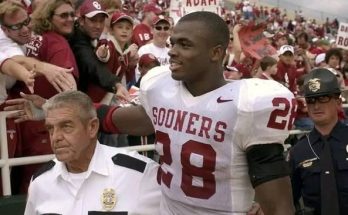When the dust settles in West Texas and the echoes of roaring crowds fade from the walls of Jones AT\&T Stadium, certain names still hang in the air like legends etched in crimson and black. One of those names—forever linked to Texas Tech’s golden era of offensive fireworks and unforgettable moments—is Graham Harrell. The former Red Raider quarterback, whose arm rewrote record books and whose leadership ignited a football renaissance in Lubbock, has now received the ultimate honor: selection to the Texas Tech Ring of Honor.
For Texas Tech fans, this recognition is long overdue. Harrell wasn’t just a great quarterback—he was a cultural phenomenon in Lubbock, a central figure in the air-raid revolution that defined a generation of Big 12 football. His selection to the Ring of Honor represents more than a nod to past accomplishments; it’s a declaration that Harrell’s impact on the program transcended statistics, seasons, and even sport itself. His name will now reside alongside the greatest to ever wear the Double T, an eternal symbol of excellence and innovation.
Harrell’s story begins like many Texas football tales do—rooted in grit, guided by discipline, and elevated by extraordinary talent. Hailing from Ennis, Texas, Harrell came to Texas Tech with high expectations and an uncanny football IQ. Under the guidance of head coach Mike Leach and his now-iconic air raid system, Harrell didn’t just flourish—he exploded onto the national scene. By the time he hung up his jersey, Harrell had become one of the most prolific passers in NCAA history, orchestrating a symphony of touchdowns and yardage totals that left defensive coordinators gasping for answers.
Harrell’s most memorable season came in 2008, when he and superstar wide receiver Michael Crabtree led Texas Tech to an 11-2 record and a share of the Big 12 South title. The signature moment of that season—and arguably one of the most iconic plays in college football history—came against the top-ranked Texas Longhorns. With just seconds remaining on the clock, Harrell fired a strike to Crabtree down the sideline, who broke free from defenders and tiptoed into the end zone to seal a 39-33 upset that sent Jones Stadium into bedlam. It wasn’t just a win; it was a defining moment in Texas Tech history, and Harrell was at the heart of it.
That play, that game, that season—it all formed the foundation of Harrell’s legend. But his contributions to Texas Tech go beyond one miracle drive or a handful of viral highlights. He was the engine of an offense that redefined what college football could look like. He was a leader who commanded respect in the huddle and inspired confidence in the locker room. He was a mentor to younger players and a symbol of what Texas Tech football could achieve on the national stage.
By the end of his college career, Harrell had thrown for 15,793 yards and 134 touchdowns, both among the highest totals in NCAA history at the time. He became the first player in FBS history to throw for over 5,000 yards in two different seasons, and his performance earned him a spot as a finalist for the Johnny Unitas Golden Arm Award and the Sammy Baugh Trophy. Despite not receiving as much national award recognition as some peers from larger programs, Harrell’s production was unmatched, and his place in the college football annals was unquestioned.
Following his collegiate career, Harrell spent time in the NFL and CFL, though his professional playing career never reached the same heights as his time in Lubbock. But his impact on the game didn’t end there. Harrell transitioned into coaching, bringing the air raid principles with him and helping to develop offenses at programs like North Texas, USC, and West Virginia. His football mind remained sharp, his connection to Texas Tech unwavering. Even as he coached across the country, he remained a Red Raider at heart—a representation of the program’s ideals and identity.
The Texas Tech Ring of Honor is a sacred place. Only the most iconic figures in Red Raider history are selected—those whose legacies changed the program forever. Harrell now joins that elite group, which includes names like Donny Anderson, E.J. Holub, and Zach Thomas. It’s not just an award; it’s a permanent reminder that Harrell’s time in Lubbock wasn’t fleeting. It was transformative.
For fans who watched Harrell play, this honor brings back a flood of memories: the pre-snap calm in his eyes, the fearless precision of his deep throws, the way he brought a sense of belief every time he stepped onto the field. It was more than football. It was the belief that Texas Tech could stand toe-to-toe with college football’s giants and not just survive—but win.
To see Harrell’s name etched high above the stadium, where generations of fans will point and tell stories to their children, is to understand what legacy really means. It’s not about temporary fame or fleeting statistics. It’s about impact. It’s about culture. It’s about rewriting what people believe is possible. Harrell did all of that and more.
The ceremony that will induct Harrell into the Ring of Honor promises to be an emotional affair, not just for him, but for Red Raider fans everywhere. It’s a full-circle moment for a quarterback who gave everything to the program and asked for nothing in return. It’s a celebration of excellence, perseverance, and the kind of grit that defines Texas Tech football.
In the world of college football, where players come and go and seasons are measured in fleeting wins and losses, immortality is rare. But Graham Harrell has achieved just that. He will be remembered not only as one of the best to ever play the game at Texas Tech, but as someone who fundamentally altered the trajectory of the program.
His story is a reminder of what makes college football so special—the emotional highs, the improbable triumphs, the community of fans and players forever bonded by shared memories. Harrell wasn’t just a quarterback; he was the heart of an era. His jersey might be retired, but his legacy will always live on in the stands, in the hearts of fans, and now, proudly, in the Ring of Honor.
For Texas Tech, honoring Harrell is more than tradition—it’s truth. It’s acknowledging that there are moments and people who come along and change everything. Graham Harrell was one of those people. And now, his name will shine under the West Texas sky, immortalized for generations of Red Raiders to come.



